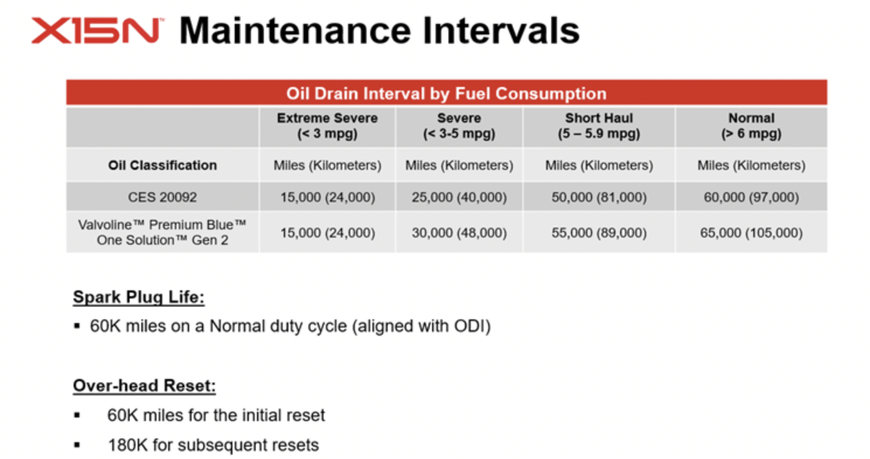www.auto-innovations.net
15
'23
Written on Modified on
CUMMINS News
Cummins ABOUT MAINTAINING AND SERVICING COMMERCIAL NATURAL GAS ENGINES
Natural gas engines have been around for decades now. They offer a range of benefits, including reduced emissions and operating costs compared to diesel engines.

Despite a high degree of parts commonality, there are some maintenance differences between natural gas engines and diesel engines. This article delves into the world of natural gas engine maintenance and service. It provides insights into the unique requirements and best practices for keeping these engines running smoothly.
A major benefit of natural gas engines is that they do not require a complicated exhaust treatment system. In diesel vehicles, these systems are used to treat post-combustion gases by filtering out soot and reducing NOx emissions. Over time, the filters clog and must be cleaned or replaced to ensure performance.
Natural gas engines are, in contrast, intrinsically clean. They produce very little NOx and virtually no soot, so only light exhaust aftertreatment is needed. Cummins’ engines use a maintenance-free three-way catalyst exhaust treatment system, eliminating the need for filter changes or replacement of exhaust control systems. This reduces the cost and complexity of maintenance and decreases fleet downtime.
When maintaining a natural gas engine, there are several best practices that need to be kept in mind. First, it’s important to factor in idle time to the maintenance schedule. That’s why it is recommended to track hours on the engine and not just miles driven when tracking maintenance intervals. This is especially important to keep in mind with vocational and transit applications given the high level of idle time inherent to those duty cycles.
Using genuine Cummins parts such as spark plugs and oil, can significantly reduce unexpected issues and downtime of natural gas vehicles. All Cummins components have undergone validation to ensure they meet the company's design standards and emission certifications.
Low pressure fuel filters should be drained regularly as a routine maintenance practice. This is a quick process that involves loosening the filter and allowing the fuel to drain out. This helps to protect the engine and allows for the identification of any issues in the compressor.
Checking for the latest ECM calibration at every spark plug change is also recommended. These calibrations are typically released once or twice a year. If a fleet has already invested in software tools for updating diesel engines, the same tools can be used for natural gas engines.
Natural gas engines aren’t as forgiving as diesel engines when it comes to missing service intervals, especially oil drains. Cummins has put significant effort into educating fleets over the years about the best way to track the time on the engine to make sure the right intervals are being met, whether engine hours or miles driven is the primary metric being used.
The CES 20092 spec oil is the recommended oil for spark ignition engines and is the result of a joint effort by Cummins and Valvoline. This oil can be used on diesel, natural gas and gasoline engines.
Cummins is set to launch the highly anticipated X15N engine in 2024. With this natural gas engine, Cummins is working on synchronizing maintenance intervals to allow users to complete more service events at once. Below you’ll find the X15N maintenance intervals.

Facilities that service natural gas vehicles require specific safety measures to prevent potential safety hazards. Ventilation, path control, space heating, electrical wiring, equipment installation, and methane detection and control systems are some of the safety measures that need to be taken. For additional safety questions, fleets can connect with their local Clean Cities coordinator.
Experienced mechanics require only supplemental training to work on natural gas vehicles, since their maintenance closely resembles the maintenance of traditional vehicles. There are examples of fleets that run a combination of diesel and natural gas engines. Fleets with large numbers of natural gas vehicles often keep natural gas and diesel maintenance separate for efficiency. However, maintenance for both natural gas and diesel vehicle is possible at the same premises if there is at least one dedicated bay with the appropriate safety considerations for natural gas systems. The joint venture between Cummins and Rush Enterprises will provide customers with a service network through Rush Truck Centers’ dealerships and Cummins’ distributors. With over 250 locations in the US and Canada, both companies' networks will be equipped with certified technicians and a comprehensive natural gas vehicle parts inventory.
Unlike diesel, natural gas cannot be spilled. Any leaking natural gas, being in gaseous form, will quickly dissipate, and will not soak gloves or overalls, or leave residues on surfaces. Maintenance crews may have a more pleasant experience working on a cleaner, soot-free engine.
www.cummins.com

